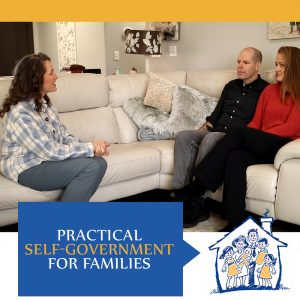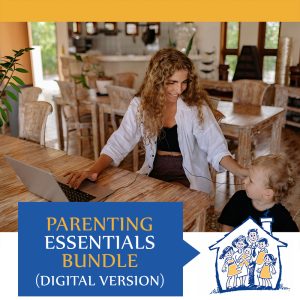Treasure the Little Ones
As I rounded the corner of a shopping isle at a local grocery store, I heard crying. Through tears a young girl, about 8 years old, said, “Tell me what it is Mom. Tell me what this is.”
The moment I turned into this isle, the mother was in the middle of yelling, “Shut up right now or you’ll be sorry!!!”
The mother caught a quick glimpse of me and immediately pretended she was examining the paper towels on the shelf. Then she quickly walked away. She had four girls with her. The oldest looked about 13. The 13-year-old, who didn’t see me, grabbed her younger sister by the arm and whacked her on the back side as hard as she could. The older sister looked proud of herself — even though she now knew I was watching. Then the two of them quietly followed the group to the next isle.
Upon seeing this public family battle, questions flooded my mind. “Why couldn’t they answer the child’s question? What was more important? If the mother knew she wasn’t treating her child well when she saw me, then why would she do it when no one was looking? If the mother parents like this is public, how does she parent in private? How much hitting happens at home? Is that why the older daughter thinks she can hither sister? Why are the family roles so messed up? Or, is the mother just happy to have someone else do the hitting?”
I don’t know this family, their situation, what the mother was dealing with that day, or why the child was being ignored. But, I do know these people stopped their battles when they saw me watching. This must mean they know they should be treating each other better.
This scene broke my heart. Many parents are forgetting to treasure their children in all moments; even during stressful times. Emotions cloud judgement and cover truth, which cause parents to focus on the wrong treasures: time, quiet, work, money, speed, power, etc. Wars are oftentimes fought in moments of emotional drunkenness. How can families stop warring and start valuing each other when stress sets in?
Battle Zones, Not Homes
The children don’t always know their lives and homes are battle zones. They don’t know any different and think all parents must be stressed and short-tempered continually. I hear youth say they can’t wait to leave home because they feel suffocated. Seldom do they refer to the home as a battle zone. But parents frequently call their homes “battle zones.” Parenting interactions are “wars” and “battles.” “I just had to win that battle,” they say.
This is proof they know family and home shouldn’t be like this. But they don’t know what else to do.
Whenever someone becomes selfish or mean, disconnects from relationships, doesn’t follow rules, or decides to lie, that’s when wars begin. In times of selfishness, wickedness always prevails, and the spirit of truth is silenced.
The Spirit that Guides
When things are going well in our relationships and the family is communicating calmly and lovingly (even when someone is corrected), there’s a feeling of unity and love that’s energizing and fulfilling. This is a spiritual confirmation that things are good.
The spirit of truth feels like love, faith, modesty of action and thought, vigilance, safety, comfort, self-restraint, responsibility, honest work, righteousness, prayerfulness, peace, and soberness. All these work together to create a joy that attracts the family, and others, to the home.
A New Government
There are examples throughout history of happy families. There are also stories about disobedient children, and militant vs. permissive parents. A common thread of truth runs through these biographical and fictional tales of families. Only one type of family government works to cultivate the spirit of truth and train the heart of the child toward obedience. Obedience is a principled self-governing form of family government.
In the example of the mother yelling at her daughter in the store, the family is following a fear-based, please-the-tyrant type of government structure where everyone has to be micromanaged. Many would call this communism.
Anarchism vs. Communism
The opposite of a communistic family government structure is anarchism, where the parent is passive and there is no direction or clear right or wrong — except that gaining worldly goods and praise is generally considered good and necessary for power. In anarchism, the parents view themselves as a friend more than a parent. Children whine a lot.
Most parents find themselves vacillating between anarchism and communism. They don’t like communism but have to use it when the child isn’t doing well with the anarchism system. In fact, sometimes the most emotionally out-of-control parents are the ones that usually allow anarchy to reign. They feel like they give their children everything by not requiring much and not giving “No” answers. So, when the child doesn’t act respectfully — which is bound to occur in an anarchism structure —parents are offended and becomes overly emotional. Usually they get emotional in public because that’s where they expect children to perform best. However, inconsistent parenting at home leads to behavior issues in public.
Many parents are inconsistent because their principles don’t match their parenting skills or philosophies.
Principled Parenting
To be sober in parenting and always have the spirit of truth with us, our actions must match our principles. This often requires additional self-government skills and deliberate focus on who we are, who our children are, and what our roles are in each interaction. Principled parenting is predictable and feels safe. This means children know beforehand what parents will say when correcting. Parents pre-teach the skills before correcting moments. Out-of-control, unpredictable emotions are held in check when giving corrections. This freedom-based, principled family governing structure requires parental self-government.
To treasure our little ones and make shopping trips enjoyable for the whole family, we need to change our family government structures. For freedom to spread throughout the governments of the world, we first must experience freedom in our family governments and homes.
Learn the self-government skills your family needs. Register for the next Self-Government Parenting Mastery training!
Index
- Abuse, Accepting No Answers and Criticism, Authority, Behaviors, Calm, Changing Hearts, Character Building, Connecting (Looking in the eyes), Control, Correcting, Culture, Disagreeing Appropriately, Expectations, Family Culture, Family Standard, Family Unity, Power of Calm, Power Struggling, Pre-Teach, Problem Solving, Relationships, Respect, Roles, Seek to Understand, Sibling Interactions, Skills, Social Skills, Structure, Tone, Unity






